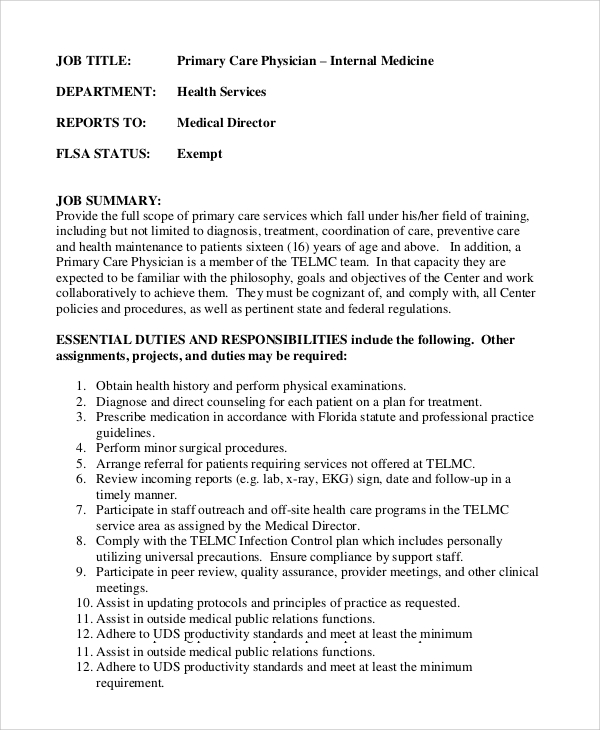
Image source: https://images.sampletemplates.com/wp-content/uploads/2016/12/02162523/Primary-Care-Physician-Assistant-Job-Description.jpg
If you want to make a differenceand have a positive influence on health care in this countrythe Physician Assistant profession is waiting for you.
What Does A Physicians Assistant Do?
Don't confuse physician assistants with medical assistants, who aren't qualified to do much more than take your blood pressure. Physician assistants do 80% of what doctors doconduct exams, diagnose conditions, prescribe medications, even assist in surgery. While PAs are supervised by physicians, they have considerable independence. And while pay isn't quite as much as that of a doctor, it's far from sickly. Also, training is much shorter than it is for doctorstypically consisting of three years, post-bachelor's.
No surprise this is one of America's fastest-growing professions. Physician assistants work wherever physicians or health care organizations employ them. They can be found in virtually all health care settings. Physicians Assistants work in hospitals, physicians' offices, HMOs, correctional institutions, military installations, VA medical centers, nursing homes, public health agencies, community clinics, research centers, urban/rural health clinics, health care education and administration offices, industrial medicine clinics, and even the White House.
Physician assistants can take medical histories, perform physical exams, order and interpret laboratory tests, diagnose and treat illnesses, counsel patients, assist in surgery, and set fractures.
Physician assistants are educated as generalists in medicine; all programs emphasize primary care. Although their education and credentialing are based on a primary care foundation, PAs can work in specialty fields, such as cardiovascular surgery, orthopedics, and emergency medicine. Most choose the primary care specialty areas of family medicine, internal medicine, pediatrics, and obstetrics and gynecology.
Education & Training
Requirements have been ratcheted up. Today, the typical student admitted to the three-year training program has a pre-med bachelor's degree, plus a few years of experience as a nurse, paramedic, or emergency medical technician.
All states require that Physicians Assistants complete an accredited, formal education program and pass a National exam to obtain a license. PA programs usually last at least two or three years and are full time. Most programs are in schools of allied health, academic health centers, medical schools, or 4-year colleges; a few are in community colleges, the military, or hospitals. Many accredited PA programs have clinical teaching affiliations with medical schools. Most applicants to PA educational programs already have a bachelors degree.
0 Response to "Career Profile Become a Physicians Assistant"
Posting Komentar